こんにちは、Kinokoです。
海外駐在員として働く私が、「ためになる!」と思ったボキャブラリーを人気漫画の英語版から厳選して紹介します!日本の漫画は海外でも人気が高く、同僚との会話に出てくることも多々あります。
今回は「鬼滅の刃」の英語版1巻「Demon Slayer: Kimetsu no Yaiba, Vol. 1: Cruelty」です。
このブログは英語を英語で理解したい人向けに書いています。
さらにこんな人にもおすすめです。
- 鬼滅の刃の英語版を多読に取り入れたい人
- 海外駐在で英語力アップが必要な人
- TOEICのその先へ進みたい人
- 語彙を増やしたい人
- 語彙力を確認したい人
皆さんの英語学習に必ず役に立つはずです!
概要
語数: 約4,546 (第1話の1ページ平均語数×有効ページ数で算出)
英語で記載されているあらすじを日本語訳してみました。
鬼を殺すことを学ぶのは容易ではありません。どこから始めたらいいのか炭治郎(Tanjiro)には想像もつきません。突如登場した冨岡義勇(Giyu)はどこへ行けばいいのかを知っている様子です。答えを知っているかもしれません。しかし、炭治郎はまず冨岡義勇から妹を守らなければなりません!
素直に訳すと、変な日本語になってしまいました。でもこれが英語圏の物事の考え方です。翻訳せずに英語を英語のまま読むと、「こんな考え方するのか~!」や「こんな表現するのか~!」と驚くことが多いです。
この作品から62個のボキャブラリーを厳選しました!今回も盛り沢山のボキャビル記事になりました。
その前にまずは便利フレーズを3つ紹介します。
作中の便利フレーズ3選
ためになりそうなフレーズ
Thanks for fixing my shoji door the other day!
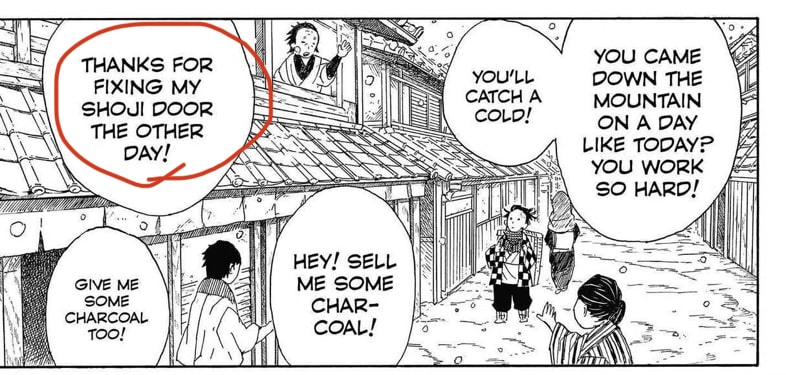
ある村人が炭治郎に「あの時/この間は障子直してくれてありがとう!」と言っているシーン
The other dayは「ある日さー(いつだったか)、◯◯したんだよ、でね…」など、会話の出だしとしても使えます。

The other day, I’ve been to a book store and…
(こないださ、本屋に行ったんだよ、そしたらね…)

Wow, it’s crazy, pal.
といった具合で使います。
Because Demon Slayers cut them down. Have for ages…
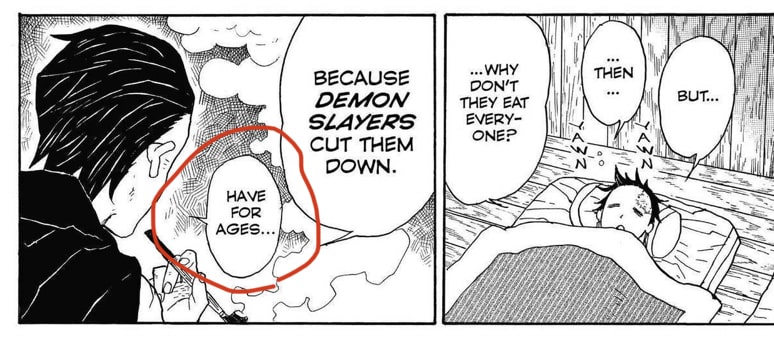
家に帰ろうとする炭治郎を引き留めたSaburo。「鬼狩りが鬼を切り殺してきた。長い間。」と説明しているシーン
「for ages」はハリポタのRonもよく使う表現で、「長い間」という意味です。
「for a long time」に飽きたらこの表現を使ってみてください。
私のオーストラリア人同僚に対して使ったら「It’s a good English expression!」と言ってました。

I’ve known that for ages, friend!
(そんなんめっちゃ前から知ってたし!)

Ah!
Ishould have skeweredyou both!
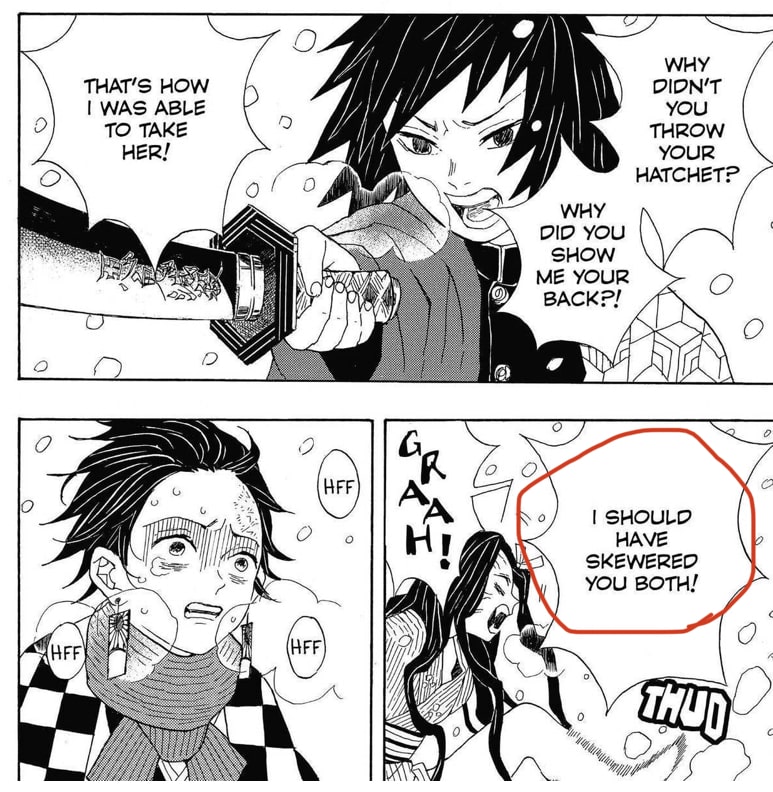
義勇が炭治郎に放った一言で、「二人とも串刺しにしておくべきだった!」と怒っているシーン
should + have + 過去完了形で「~すべきだった」というニュアンスです。
発音は「shudavu」です。否定バージョンは「shudana」です。
この表現もほんと〜に良く使います。

I should’ve done that…
(それやっときゃよかった…。)

He should have not bought it.
(彼、それ買うべきじゃなかった。)
その他にも、
would + have + 過去完了形の「Woudav」
could + have + 過去完了形の「 Coudav」
も合わせて押さえておくと便利です。

I would’ve had the same mistake if I didn’t know that.
(それ知らなかったら、同じ間違いするとこだった。)

You could’ve been a millionaire if I said that.
(私がそれ言ってたら、あなたは億万長者になれてたよ。)
ボキャブラリー
英語を英語で理解する力を身につけるため、ボキャブラリーとその意味を全て英語で記載しています。意味は主にGoogle Dictionaryから引用しました。
ここに記載の単語を事前に覚えると、鬼滅の刃(英語版)を楽に読了できると思います。
| No | Vocabulary | Meaning |
|---|---|---|
| 1 | pitch black | completely dark. |
| 2 | feast | a large meal, typically a celebratory one.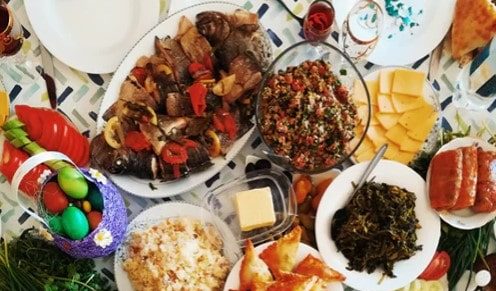 |
| 3 | charcoal | a porous black solid, consisting of an amorphous form of carbon, obtained as a residue when wood, bone, or other organic matter is heated in the absence of air.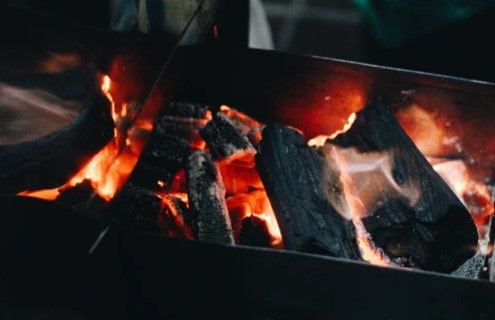 |
| 4 | commotion | a state of confused and noisy disturbance. |
| 5 | cling | hold on tightly to. |
| 6 | sniff | draw up air audibly through the nose to detect a smell, to stop it running, or to express contempt. |
| 7 | bundle | a collection of things or quantity of material tied or wrapped up together.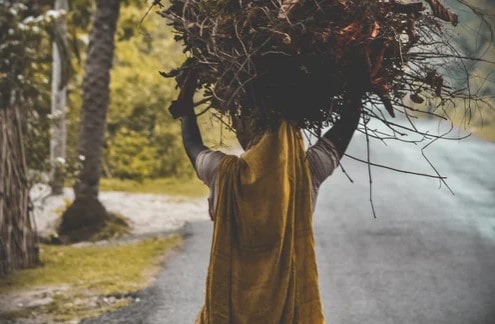 |
| 8 | roam | move about or travel aimlessly or unsystematically, especially over a wide area. |
| 9 | slayer | someone who kills a person or animal in a violent way. |
| 10 | hibernate | /ˈhʌɪbəneɪt/ (of an animal or plant) spend the winter in a dormant state. |
| 11 | scent | a distinctive smell, especially one that is pleasant. |
| 12 | bow | /baʊ/ bend the head or upper part of the body as a sign of respect, greeting, or shame. |
| 13 | pitifully | in a manner that deserves or arouses pity. pity: the feeling of sorrow and compassion caused by the sufferings and misfortunes of others. |
| 14 | whining | the making of a long, high-pitched cry or sound. |
| 15 | beg | ask someone earnestly or humbly for something. |
| 16 | hatchet | a small axe with a short handle for use in one hand.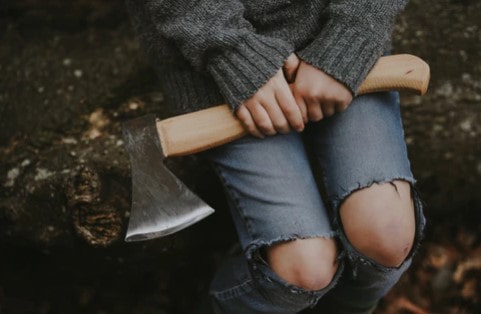 |
| 17 | skewer | /ˈskjuːə/ fasten together or pierce with a pin or skewer.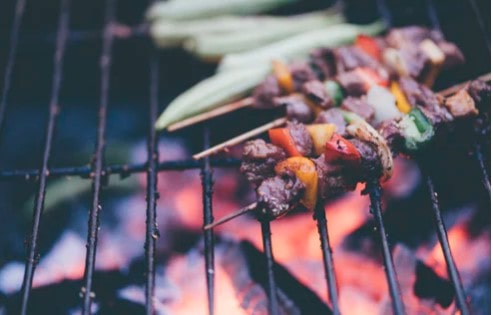 |
| 18 | unwavering | steady |
| 19 | limb | an arm or leg of a person or four-legged animal |
| 20 | give no quarter | not show any pity. |
| 21 | straw | /strɔː/ dried stalks of grain, used especially as fodder or as material for thatching, packing, or weaving.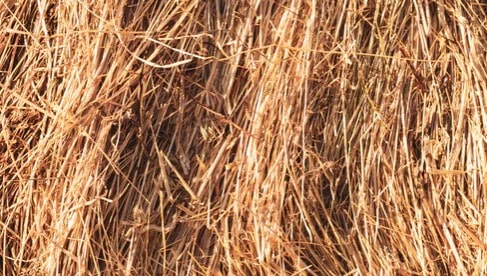 |
| 22 | bamboo | a giant woody grass which is grown chiefly in the tropics. |
| 23 | stubborn | /ˈstʌbən/ having or showing dogged determination not to change one’s attitude or position on something. |
| 24 | dig | break up and move earth with a tool or machine, or with hands, paws, snout, etc. |
| 25 | mole | a small burrowing mammal with dark velvety fur, a long muzzle, and very small eyes, feeding mainly on worms, grubs, and other invertebrates.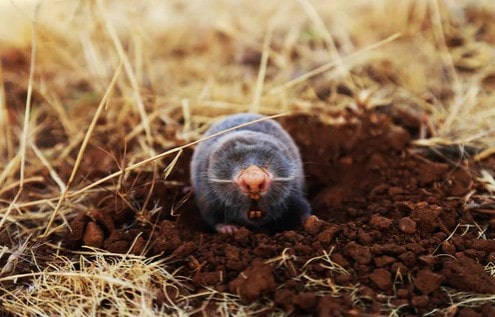 |
| 26 | scrunch | become crushed or squeezed into a compact mass. |
| 27 | rip | tear or pull (something) quickly or forcibly away from something or someone. |
| 28 | tangle | twist together into a confused mass.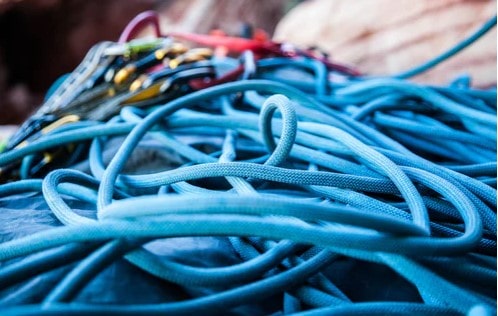 |
| 29 | slaughter | kill (people or animals) in a cruel or violent way |
| 30 | riddle | a question or statement intentionally phrased so as to require ingenuity in ascertaining its answer or meaning. |
| 31 | stab | thrust a knife or other pointed weapon into (someone) so as to wound or kill.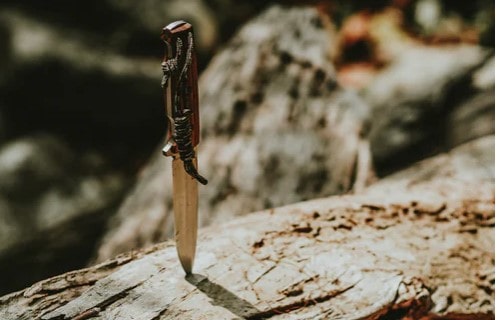 |
| 32 | slit | make a long, narrow cut in. |
| 33 | belly | the front part of the human trunk below the ribs, containing the stomach and bowels. |
| 34 | dizzy | having or involving a sensation of spinning around and losing one’s balance. |
| 35 | covered pit | a large hidden hole in the ground. |
| 36 | linger | stay in a place longer than necessary because of a reluctance to leave. |
| 37 | evade | escape or avoid (someone or something) |
| 38 | shroud | cover or envelop so as to conceal from view. |
| 39 | staple food | a food eaten routinely or every day basis. |
| 40 | descend | move or fall downwards. go down. |
| 41 | wield | hold and use (a weapon or tool). |
| 42 | boulder | a large rock. |
| 43 | whine | give or make a long, high-pitched complaining cry or sound. |
| 44 | unseemly | (of behaviour or actions) not proper or appropriate. |
| 45 | butt | (INFORMAL•NORTH AMERICAN) a person’s buttocks |
| 46 | stuck in | stick in: to become caught, lodged, or embedded inside of something. |
| 47 | embodiment | a tangible or visible form of an idea, quality, or feeling. |
| 48 | marrow | a soft fatty substance in the cavities of bones, in which blood cells are produced. e.g. marrow of your bones |
| 49 | orphan | a child whose parents are dead. |
| 50 | reassure | say or do something to remove the doubts or fears of (someone). |
| 51 | ward | guard; protect. |
| 52 | deceased | recently dead. |
| 53 | wisteria | a climbing shrub of the pea family, with hanging clusters of fragrant flowers, typically pale bluish-lilac in colour. |
| 54 | crumble | break or fall apart into small fragments, especially as part of a process of deterioration. |
| 55 | rotten | suffering from decay.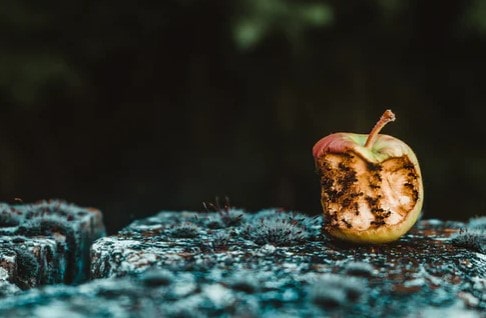 |
| 56 | imperial family | the family of emperor of Japan |
| 57 | dynasty | /ˈdaɪ.nə.sti/ a line of hereditary rulers of a country. |
| 58 | torturous | characterized by, involving, or causing pain or suffering. |
| 59 | brat | a child, typically one that is badly behaved. |
| 60 | wept | weep: shed tears. |
| 61 | leap | jump or spring a long way, to a great height, or with great force. |
| 62 | impervious | not allowing fluid to pass through. |
使用画像: Google Dictionary and https://unsplash.com/
鬼滅の刃英語版で多読を始めるなら
今回の記事では、「鬼滅の刃 1巻」の英語版「Demon Slayer Vol. 1: Cruelty」を紹介しました。
- 構文は「易しい」
- 英単語は多読初級者には「少し難しい」
- 漫画特有で「すべて大文字表記」なので、慣れていないと読みづらい
多読初心者であれば、もう少し易しい児童書やGraded Readersで大量の語数をゲットすることをお勧めします。100万語~200万語読了した辺りから、この漫画レベルの英語も楽に読めるようになると思います。
英語多読に興味がある人は、こちらの記事も読んでみてください。
とはいえ「鬼滅の刃」は職場の外国人同僚たちの間でも人気が高いです。
1冊英語版を読んでおくだけでも、いざというときの会話に役に立ちます。
英語版漫画で多読を始めてみる!鬼滅の刃 Demon Slayer
鬼滅の刃は、英語版もAmazonベストセラー1位を獲得しています(2021年1月現在)。さすがです。

それでは今日もよい一日を!

Veil Spaß!
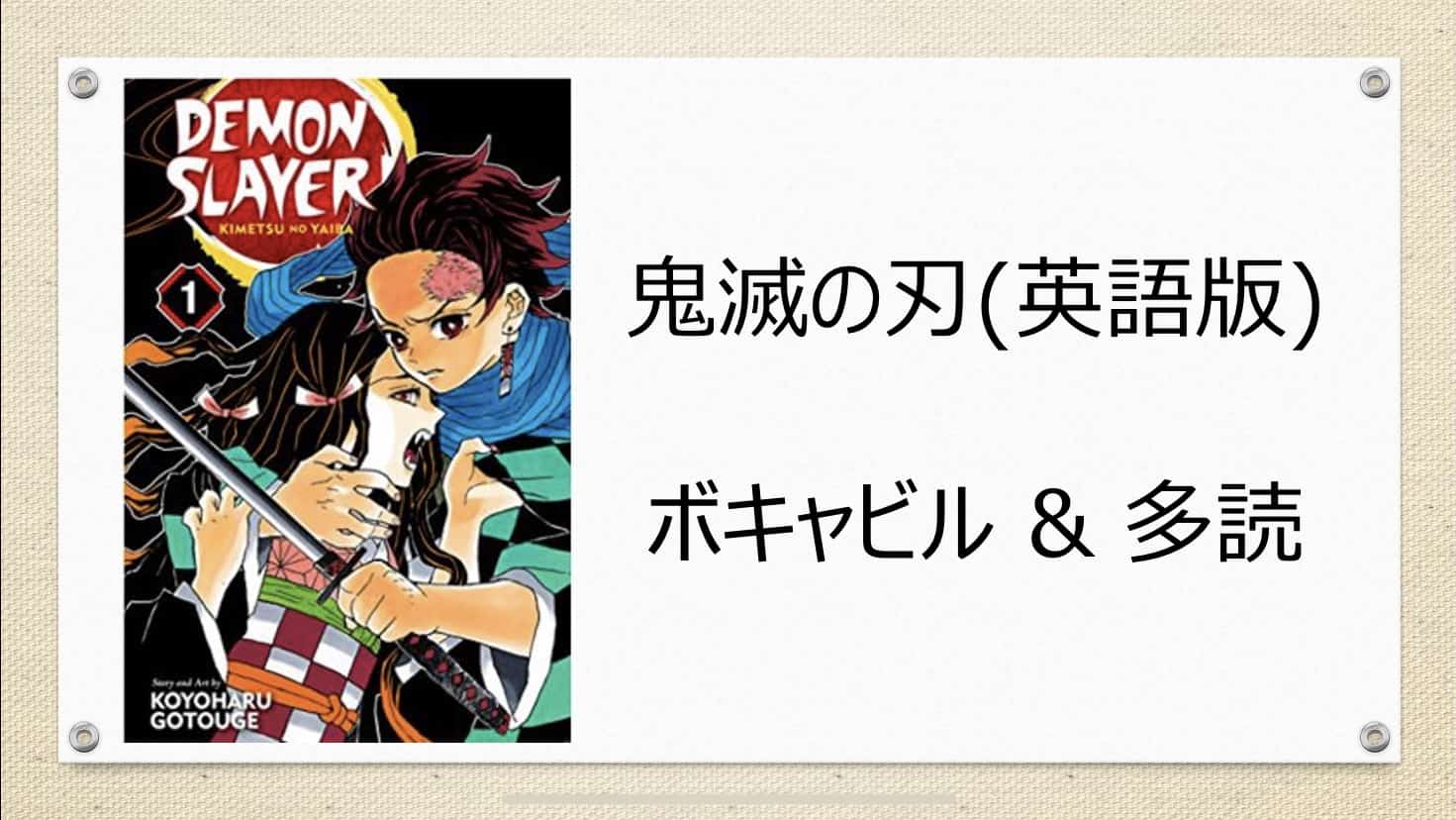






コメント